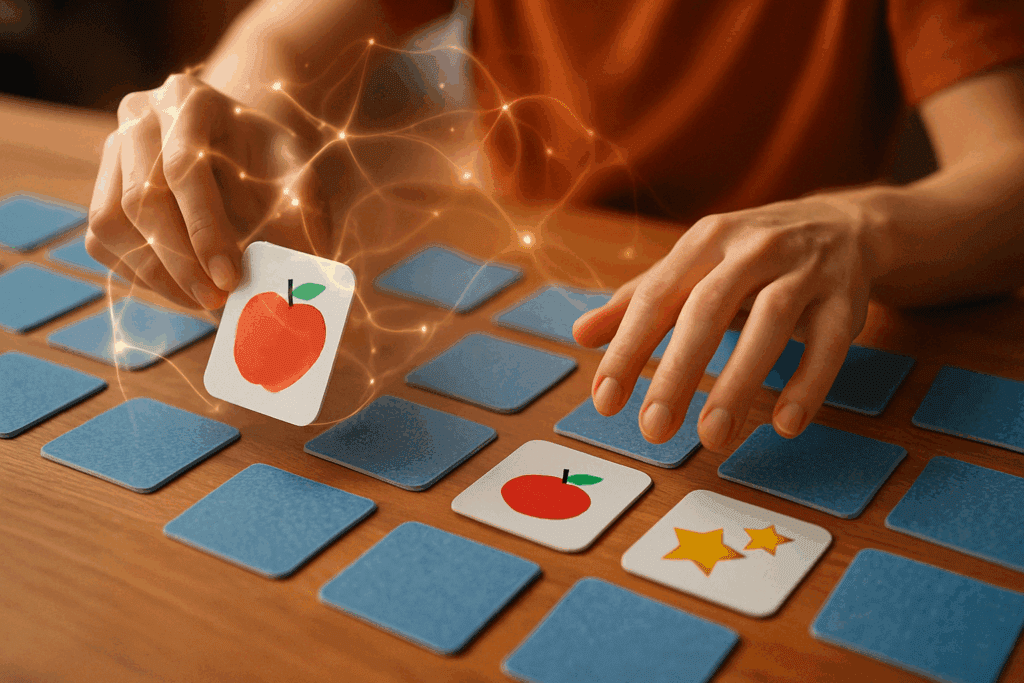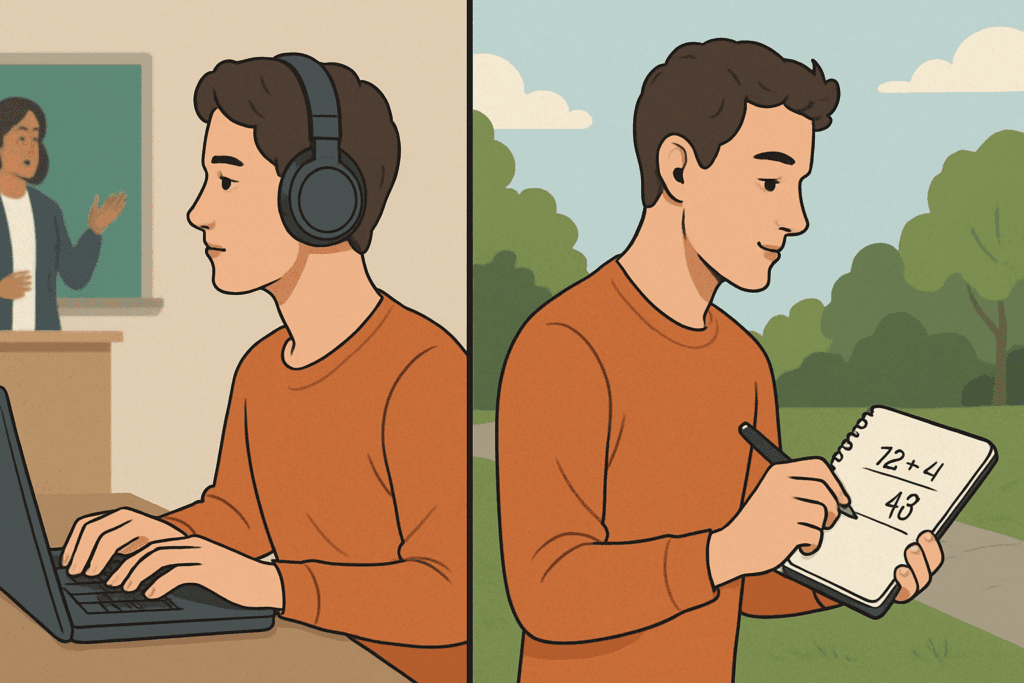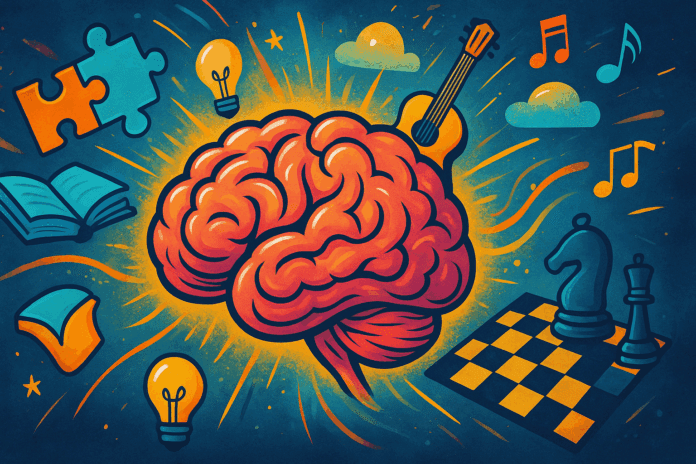Boost Brain Power Naturally by prioritizing ongoing care and stimulation for the brain, the control center of the human body. Just as physical fitness requires regular exercise, maintaining optimal cognitive function demands consistent attention, particularly as we age. Enhancing cognitive abilities and memory retention is key to sustaining long-term brain health. Engaging in cognitive training activities and memory exercises can boost brain power naturally, sharpening mental agility, improving attention, and strengthening recall. These practices not only enhance overall cognitive function but also help reduce the risk of age-related decline. This article explores a variety of scientifically backed activities and exercises designed to support mental wellness and encourage neuroplasticity—the brain’s ability to adapt and grow throughout life.
You may also like: How to Improve Focus at Work Naturally: Science-Backed Techniques to Boost Mental Clarity and Long-Term Brain Health

Cognitive Training Activities: Strengthening the Brain’s Capacity
Cognitive training activities are targeted exercises designed to engage various mental processes, including memory, attention, executive functions, and problem-solving. Engaging in these activities regularly can help improve overall cognitive function and even delay the onset of mental decline associated with aging or neurological conditions. By incorporating mental challenges that engage different brain areas, these activities can enhance cognitive processing speed, improve focus, and sharpen problem-solving skills.

Memory Games: A Fun and Effective Way to Boost Brain Power
One of the most accessible and enjoyable ways to train your brain is through memory games. Games such as card matching, crossword puzzles, or memory sequences have been shown to activate different regions of the brain, particularly the hippocampus, which plays a critical role in memory formation. These exercises encourage both short-term and long-term memory recall, helping the brain to process and store new information more efficiently. In addition to these, word association games and activities that involve remembering patterns or sequences provide cognitive challenges that improve both attention and retention.
A 2019 study published in Nature Human Behaviour found that engaging in memory games significantly improved participants’ memory recall abilities and cognitive flexibility. The study concluded that memory training could improve various aspects of cognition, including attention and problem-solving skills. Furthermore, playing memory games regularly has been associated with slowing cognitive decline in older adults, providing long-term benefits for brain health.

Learning New Skills: The Power of Continuous Knowledge Acquisition
A powerful yet often overlooked way to boost brain power naturally is to constantly challenge yourself to learn new skills. Whether it’s learning a new language, picking up a musical instrument, or studying a new field of knowledge, engaging in activities that demand mental effort and creativity is key for cognitive health. Studies have shown that the brain benefits greatly from these types of cognitive workouts, particularly in the areas of memory and processing speed. Learning something new engages both short-term and long-term memory systems, allowing the brain to strengthen neural connections and form new ones.
For example, when learning a language, the brain is forced to create and maintain new associations and connections between words and their meanings. This kind of linguistic training stimulates the brain’s language centers, including the Broca’s area and Wernicke’s area, which are involved in speech production and comprehension. A 2016 study published in the Journal of Neuroscience demonstrated that language learners showed increased gray matter density in brain regions responsible for memory, executive functions, and language comprehension. This finding underscores the cognitive benefits of learning new languages as a form of brain training.
In addition, engaging in complex cognitive activities like learning a new instrument enhances auditory processing, motor coordination, and overall brain connectivity, providing long-lasting benefits for cognitive function. Research in Psychology and Aging has shown that older adults who engage in musical training experience cognitive improvements, particularly in memory and processing speed. The findings suggest that learning and mastering a musical instrument can act as a potent cognitive enhancer, even later in life.
Problem-Solving and Strategy Games: Enhancing Mental Flexibility
Another excellent way to improve cognitive function is through engaging in problem-solving and strategy games, such as chess, Sudoku, or logic puzzles. These games stimulate executive functions, which are critical for higher-order cognitive processes such as decision-making, planning, and goal-setting. Regularly participating in such games trains the brain to think analytically and strategically, ultimately improving mental flexibility. As these activities require individuals to think critically, adapt to new challenges, and find creative solutions, they enhance problem-solving abilities and strengthen decision-making processes.
Playing chess, for instance, encourages players to think several steps ahead, requiring mental foresight, strategic planning, and complex decision-making. The cognitive benefits of playing chess have been widely studied. A 2019 review in Frontiers in Psychology concluded that chess players showed improved cognitive flexibility, enhanced memory, and greater problem-solving skills compared to non-players. The ability to navigate complex scenarios in chess translates to real-life skills, such as planning, multitasking, and adapting to unforeseen circumstances.
Memory Exercises: Enhancing Recall and Retention
Memory exercises are some of the most effective ways to improve brain health and cognitive function. These exercises target the brain’s ability to encode, store, and retrieve information, strengthening the memory centers in the brain over time. Just as physical exercise improves muscle strength, memory exercises work to enhance mental capacity, making the process of remembering and recalling information easier and more efficient.
Mnemonic Devices: Simple Techniques for Enhanced Memory
One of the most commonly used memory exercises involves mnemonic devices. These memory aids help the brain organize information in a way that makes it easier to remember. For example, the method of loci, or memory palace technique, encourages individuals to mentally place pieces of information in a familiar location or structure, creating a vivid mental map that helps in memory retrieval. Mnemonics can also take the form of acronyms or rhymes, which serve as mental shortcuts that simplify complex information.
Using a mnemonic to remember a shopping list is a simple example: imagine each item on the list being placed at a different point along your route home. By visualizing these items in specific, well-known locations, the brain is able to form associations that make it easier to recall each item when needed. This exercise not only strengthens memory but also boosts attention and concentration, which are essential for long-term cognitive health.
Spaced Repetition: A Proven Method for Long-Term Memory Retention
Another highly effective memory exercise is spaced repetition, which involves reviewing information at increasing intervals to reinforce memory retention. The process works by leveraging the brain’s natural ability to strengthen neural connections over time. Instead of cramming all the information at once, spaced repetition involves reviewing the material at carefully spaced intervals, which helps the brain to consolidate and retain the information more effectively.
For example, language learning apps such as Anki use spaced repetition algorithms to determine when users should review vocabulary words based on their individual learning progress. This method has been shown to improve long-term recall and retention, making it an invaluable tool for anyone looking to enhance their memory. The more frequently the brain retrieves information, the stronger the memory connections become.
Active Recall: Strengthening Memory Through Retrieval Practice
Active recall is another powerful memory exercise that involves recalling information from memory without the aid of external sources, such as notes or textbooks. This exercise forces the brain to engage in the process of retrieval, which reinforces neural pathways and makes the information more likely to stick in long-term memory. This technique has been proven to be more effective than passive review because it strengthens the brain’s ability to access and apply information in different contexts.
For example, when preparing for an exam, actively recalling facts and concepts instead of simply rereading notes can significantly improve memory retention. This active engagement with the material promotes better understanding and deeper learning, ultimately improving both memory and cognitive function.
Cognitive Processing Activities: Stimulating Mental Agility and Focus
Cognitive processing activities are designed to enhance mental agility, attention, and the ability to process complex information quickly. These exercises help individuals stay mentally sharp and focused, providing the mental clarity needed to navigate everyday tasks and professional challenges.

Mindfulness Meditation: A Powerful Cognitive Processing Tool
Mindfulness meditation is a widely studied cognitive processing activity that has shown to improve focus, emotional regulation, and mental clarity. The practice involves directing one’s attention to the present moment, typically by focusing on the breath, bodily sensations, or the surrounding environment. Through regular practice, mindfulness meditation has been shown to enhance attention span, reduce mental distractions, and promote cognitive flexibility.
Research has demonstrated that mindfulness practice can increase the thickness of the prefrontal cortex, a brain region responsible for decision-making, self-regulation, and focus. Furthermore, mindfulness has been associated with enhanced working memory capacity, allowing individuals to retain and process information more effectively. A 2018 meta-analysis published in Psychological Science found that mindfulness meditation significantly improved cognitive performance, particularly in tasks requiring sustained attention and working memory.

Dual-Tasking: Improving Cognitive Flexibility and Multitasking Skills
Dual-tasking, or performing two tasks simultaneously, is another effective cognitive processing activity. These exercises require individuals to switch their attention between multiple tasks, improving cognitive flexibility and the ability to process information from different sources. For example, an individual might listen to a lecture while taking notes or solve math problems while walking.
Dual-task exercises challenge the brain to manage and prioritize competing streams of information, which ultimately enhances multitasking abilities and mental flexibility. These exercises are beneficial for improving cognitive function in fast-paced environments, such as work or school, where the ability to juggle multiple tasks efficiently is crucial for productivity and success.
Cognitive Flexibility Training: Strengthening Mental Adaptability
Cognitive flexibility refers to the brain’s ability to switch between different thoughts or adapt to new information quickly. Training cognitive flexibility can improve mental agility and the ability to cope with change, which is essential for problem-solving and decision-making. Cognitive flexibility exercises, such as shifting between tasks or changing problem-solving strategies, can help individuals think more creatively and remain adaptable in the face of challenges.
For example, a simple exercise that promotes cognitive flexibility is engaging in a timed challenge that requires individuals to quickly switch between different cognitive tasks, such as solving math problems, writing sentences, or answering questions. By repeatedly practicing these exercises, individuals can enhance their brain’s ability to adjust to new tasks and challenges, improving overall mental performance.
Exercises to Improve Memory: Practical Tips for Daily Use
Incorporating memory-boosting exercises into your daily routine doesn’t require a special program or equipment. There are plenty of simple yet effective ways to improve memory retention and mental clarity throughout the day.
Reading and Summarizing: Strengthening Comprehension and Retention
One of the most accessible memory exercises is reading and summarizing information. This simple exercise helps reinforce comprehension and encourages active engagement with the material. After reading a passage, try to summarize the key points in your own words. This practice encourages deeper processing of the material and strengthens memory recall.
For example, when reading a book or article, take a moment to pause after each section and reflect on what you’ve learned. Writing a brief summary of the main ideas not only helps with comprehension but also reinforces the information in your memory.
Association Techniques: Strengthening Memory Through Familiarity
Association is another powerful memory technique that can improve recall. By linking new information with something familiar, you create mental connections that make it easier to remember. For example, associating a person’s name with a visual cue or a specific characteristic can help strengthen the memory of that person.
When learning new facts or concepts, try to create associations with things you already know. This technique taps into the brain’s natural tendency to link new information to existing knowledge, ultimately making it easier to recall when needed.
Engaging in Physical Exercise: Boosting Cognitive Function Through Movement
Finally, don’t underestimate the power of physical exercise for brain health. Studies have consistently shown that regular physical activity enhances memory, learning, and cognitive performance. Aerobic exercises, such as walking, running, or swimming, increase blood flow to the brain, which promotes neurogenesis—the growth of new brain cells.
Incorporating exercise into your routine not only benefits physical health but also supports long-term cognitive function. By combining mental exercises with physical activity, you can maximize the benefits for both your body and brain.
1. What are cognitive training activities, and how do they improve mental health?
Cognitive training activities are exercises specifically designed to engage the brain’s mental faculties, such as memory, attention, problem-solving, and executive function. These activities help enhance brain health by promoting neuroplasticity, the brain’s ability to reorganize and form new neural connections. Engaging in cognitive activities, such as puzzles, memory games, or learning new skills, can strengthen cognitive functions and even slow cognitive decline. Research has shown that activities like learning a new language or playing strategy-based games can significantly improve memory and cognitive flexibility. Additionally, regularly practicing these cognitive activities boosts overall mental clarity, improving focus and the brain’s capacity to process complex information.
2. How do memory exercises specifically enhance brain power and memory retention?
Memory exercises improve brain power by targeting the brain’s ability to encode, store, and retrieve information. When you engage in memory-boosting exercises such as mnemonic techniques or active recall, you’re challenging the brain to retain and access information more efficiently. For example, the method of loci, which involves associating new information with familiar locations, has been shown to enhance memory retrieval. Memory exercises are essential for strengthening the hippocampus, the brain region responsible for long-term memory formation. Over time, these exercises help enhance both short-term and long-term memory recall, allowing you to retain information with greater ease and improve your mental agility. Studies also suggest that incorporating memory workouts into daily routines can reduce the risk of age-related memory loss.
3. What types of memory exercises are most effective for boosting brain power naturally?
There are various memory exercises that effectively boost brain power naturally. Simple activities like crossword puzzles, Sudoku, and card-matching games engage the brain in recalling patterns and sequences, improving both short-term and long-term memory. Additionally, using mnemonic devices, such as acronyms or visual imagery, helps to create mental associations that make recalling information easier. For a more advanced memory exercise, consider employing spaced repetition techniques. This involves reviewing material at progressively longer intervals, which strengthens memory retention and promotes long-term recall. Studies have shown that spaced repetition can increase the retention of new information by up to 40%. The key to maximizing these memory exercises is consistency—regular engagement with these activities leads to lasting cognitive improvements.
4. What are cognitive processing activities, and why are they important for brain health?
Cognitive processing activities focus on enhancing mental agility and the speed at which the brain processes information. These activities are crucial for improving executive functions such as decision-making, attention, and problem-solving. Engaging in cognitive processing activities, such as mindfulness meditation, dual-tasking exercises, or brain games like chess, helps to improve both focus and mental flexibility. For instance, mindfulness meditation has been shown to increase the thickness of the prefrontal cortex, which is associated with improved attention and emotional regulation. Another effective cognitive processing activity is dual-tasking, where you perform two tasks simultaneously, training your brain to shift focus quickly and efficiently. Regularly practicing cognitive processing exercises not only helps sharpen your focus but also enhances your ability to adapt to new situations, ultimately boosting brain power naturally.
5. How does practicing mindfulness meditation enhance cognitive function and brain power?
Mindfulness meditation is a powerful cognitive processing activity that boosts brain power naturally by promoting mental clarity, improving focus, and enhancing emotional regulation. Regular mindfulness practice encourages individuals to pay attention to the present moment without judgment, which has been shown to reduce stress and enhance cognitive performance. Studies have found that mindfulness meditation increases the volume of gray matter in areas of the brain responsible for memory and decision-making, such as the hippocampus and prefrontal cortex. Furthermore, practicing mindfulness enhances working memory, which is critical for problem-solving and complex decision-making. Meditation also reduces distractions by training the brain to focus, making it a highly effective tool for improving mental clarity and overall cognitive function.
6. Can exercises to improve memory reduce cognitive decline with age?
Yes, exercises to improve memory can play a crucial role in reducing cognitive decline with age. Engaging in memory-boosting exercises, such as puzzles, games, or memory recall practices, helps maintain mental sharpness and can slow the progression of age-related cognitive decline. According to a study published in Frontiers in Aging Neuroscience, regular cognitive training can enhance the brain’s ability to process information and form new memories, even in older adults. Memory exercises work by stimulating the brain and promoting neuroplasticity, which helps strengthen neural connections that can weaken over time. By consistently practicing memory exercises, older adults can preserve their cognitive function, improving their ability to recall information and maintain mental clarity.
7. What role does physical exercise play in boosting brain power naturally?
Physical exercise is essential for maintaining brain health and boosting brain power naturally. Regular aerobic exercise, such as walking, running, or cycling, increases blood flow to the brain, delivering more oxygen and nutrients necessary for optimal cognitive function. Exercise promotes the release of neurotrophic factors, such as brain-derived neurotrophic factor (BDNF), which supports the growth of new neurons and strengthens neural connections. Research has shown that individuals who engage in regular physical exercise have better memory retention, improved concentration, and a lower risk of developing neurodegenerative diseases. Additionally, physical exercise has been linked to improvements in mood and reduced levels of stress, both of which are important for overall brain health.
8. How do exercises to strengthen memory contribute to long-term cognitive health?
Exercises to strengthen memory play an important role in preserving long-term cognitive health by helping to keep the brain active and engaged. Regular memory exercises, such as recalling information, solving puzzles, or practicing mnemonics, stimulate the brain’s memory centers, making them more efficient at processing and storing new information. Strengthening memory through consistent practice helps improve the brain’s plasticity, which is its ability to adapt and form new neural connections. Over time, these exercises can reduce the risk of cognitive decline, improve attention and problem-solving skills, and enhance overall mental agility. Additionally, memory strengthening exercises have been linked to improved mental resilience, allowing the brain to adapt more easily to new challenges and cognitive demands.
9. What are the best cognitive activities to improve both memory and cognitive flexibility?
Cognitive activities that promote both memory and cognitive flexibility include activities that require problem-solving, creative thinking, and the ability to shift between different cognitive tasks. One effective cognitive activity for improving these skills is engaging in strategic games like chess, where you must think several steps ahead, plan your moves, and adjust your strategy based on your opponent’s actions. Another great cognitive activity is learning a new language, which involves memory recall and the ability to adapt to new grammar and vocabulary rules. Additionally, practicing mindfulness meditation or mindfulness-based cognitive therapy (MBCT) has been shown to improve both memory and cognitive flexibility by promoting mental clarity and reducing distractions. Combining these activities into your routine can help improve cognitive flexibility, making it easier to adapt to changing environments and challenges.
10. How can I incorporate memory-boosting exercises into my daily routine?
Incorporating memory-boosting exercises into your daily routine doesn’t require a lot of time or special equipment. Start by integrating simple activities like reading and summarizing what you’ve read, which helps strengthen memory retention. Another easy exercise is practicing recall by trying to remember details about your day or specific events without looking at any notes. You can also set aside time each day for engaging in brain games, such as puzzles or memory card games, which challenge your brain to think critically and improve memory. Furthermore, making time for physical exercise, which supports cognitive function, can be an effective way to boost memory naturally. By dedicating just a few minutes each day to these memory exercises, you can gradually enhance your cognitive health and memory retention.
Conclusion: Achieving Long-Term Cognitive Health through Natural Practices
Boosting brain power naturally is not an overnight process, but by committing to regular cognitive training activities, memory exercises, and lifestyle practices, you can significantly enhance brain function and maintain cognitive health over the long term. From engaging in memory games to practicing mindfulness meditation, there are countless strategies that can support mental well-being and cognitive vitality. With consistent practice, these exercises help to strengthen memory, improve focus, and enhance overall cognitive performance.
By embracing these natural practices, you’re not only boosting your brain power but also ensuring that your mind remains sharp and capable as you age. Whether through engaging in daily brain exercises, adopting healthy sleep and nutrition habits, or staying socially active, each of these steps contributes to preserving mental clarity and ensuring a fulfilling, cognitively vibrant life for years to come.
Was this article helpful? Don’t let it stop with you. Share it right now with someone who needs to see it—whether it’s a friend, a colleague, or your whole network. And if staying ahead on this topic matters to you, subscribe to this publication for the most up-to-date information. You’ll get the latest insights delivered straight to you—no searching, no missing out.
Further Reading:
13 Brain Exercises to Help Keep You Mentally Sharp
Brain Exercises to Train Your Cognitive Abilities
Tips to leverage neuroplasticity to maintain cognitive fitness as you age
Disclaimer
The information contained in this article is provided for general informational purposes only and is not intended to serve as medical, legal, or professional advice. While Health11News strives to present accurate, up-to-date, and reliable content, no warranty or guarantee, expressed or implied, is made regarding the completeness, accuracy, or adequacy of the information provided. Readers are strongly advised to seek the guidance of a qualified healthcare provider or other relevant professionals before acting on any information contained in this article. Health11News and its authors, editors, and contributors expressly disclaim any liability for any damages, losses, or consequences arising directly or indirectly from the use, interpretation, or reliance on any information presented herein. The views and opinions expressed in this article are those of the author(s) and do not necessarily reflect the official policies or positions of Health11News.


